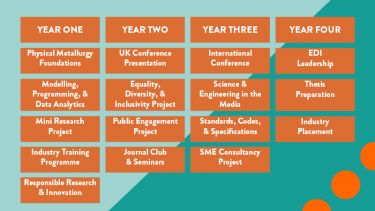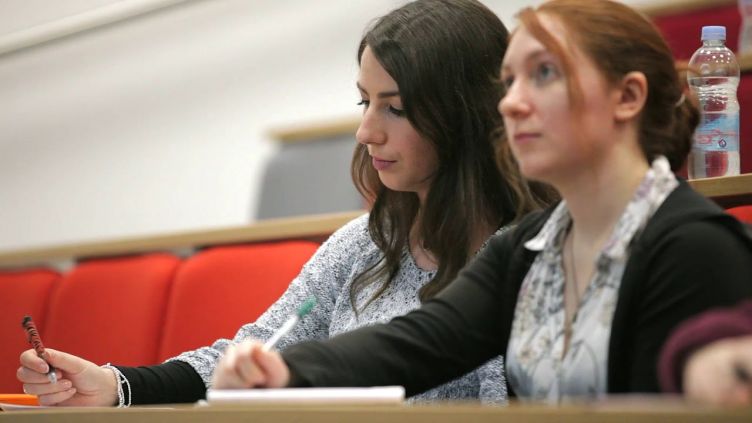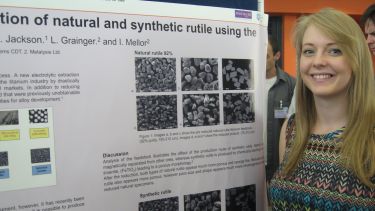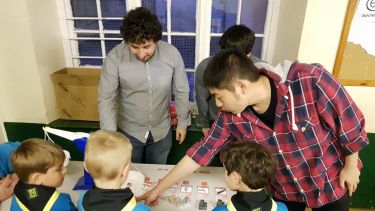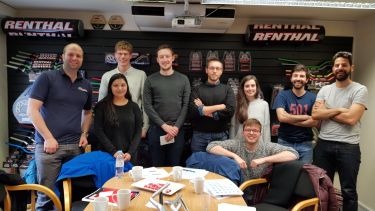Course Structure
Our Programme is different to standard doctoral pathways.
With students coming from a range of backgrounds in engineering, the physical sciences, and mathematics, the AMS CDT provides a comprehensive programme to ensure our Cohorts are best provided with all the resources required for success.
The AMS CDT combines a taught technical programme with an industry-led doctoral project, and extensive professional skills training.
Course Structure
"The broadness of the first year of the AMS CDT course allowed me to build upon the knowledge that I had from my undergraduate degree with a more materials-specific focus. This general background built the foundations for my EngD research which has continued in years 2, 3 and 4. Alongside this, the ongoing professional skills modules have allowed me to develop the soft skills required to engage and disseminate my research with a wide range of audiences."
Project Title: Development of Hybrid Advanced Manufacturing FAST-forge Route for Next Generation Aerospace Components, sponsored by Rolls-Royce.
Sam Lister | 2019 Cohort | AMS CDT
Year One
Metallic Materials Training
- Physical Metallurgy Foundations
-
Taught courses cover topics such as phase transformations, structure of metals, mechanical properties, high performance alloys, and solidification. They aim to give students underpinning knowledge in core metallurgy topics.
- Modelling, Programming, and Data Analytics
-
Taught courses cover topics such as Finite Element Modelling and Labview for data acquisition. Students will also look at Solidworks, Matlab and Python, and their application in data analysis, data presentation, and Industry 4.0 topics.
- Mini Research Project
-
The five month mini research project acts as an introduction to the doctoral project. It provides an introduction to literature review, training in experimental, and modelling techniques and the research environment. Students will write a report and have a viva.
Following completion of the mini project in July, students present a poster at the International Student Conference in Metallic Materials, then continue into their doctoral research project.
Professional and Transferable Skills
- Industry Training Programme
-
Students are set a metals manufacturing challenge by an industrial partner to the AMS CDT. Working on this from October to February, students will develop key research and team working skills.
- Transformative Technologies
-
Students undertake an intensive two-week module working in Additive Manufacturing. They work to solve a challenge set by industry in an aspect of metals manufacturing.
- Responsible Research and Innovation
-
Students get an in-depth introduction to Responsible Innovation, covering sustainability, life cycle analysis, ethics and the social acceptability of research and manufacturing, and Equality, Diversity, and Inclusivity (EDI) workshops. In the first year, Cohorts will participate in an inclusive workshop to raise awareness and understanding of EDI issues in the PGR Community.
These continue across the whole programme, to develop, exemplify and disseminate EDI best practice in the metallurgical community.
- Academic Writing Skills
-
This runs across all four years of the programme. In the first year, it includes activities such as industry visits, presenting a poster at the International Student Conference in Metallic Materials, and writing skills development.
Year Two
Industrial or International Placement
- UK Conference or Industrial Visit
-
In their second year, students will present at a UK-based conference. They may opt to organise a research visit of one or two months duration to another research organisation or their industrial partner.
This would be to carry out a specific piece of work and gain experience of another research environment
Professional and Transferable Skills
- Public Engagement Project
-
Students work in small groups to design, deliver, and evaluate an activity to engage the public with Materials Science and Engineering. This could be attending schools, or a community event, or engaging with local scout groups.
- Journal Club and Seminars
-
Students organise a series of journal clubs, where they act as a review panel and discuss the merits or limitations of a recent journal paper.
They obtain useful insight into how to approach writing a journal paper for their own outputs, and also arrange for external speakers to give seminars. This helps to develop their professional networks.
- Equality, Diversity, and Inclusivity Project
-
A student-led activity to focus on EDI impacts in an academic setting.
Year Three
Metallic Materials Training
- International Conference
-
In years two or three, students can present at Junior EuroMat - which is held every two years - or another conference of their choosing held in Europe.
Students select a conference that is aimed at Doctoral Researchers in Materials Science and Engineering from across Europe.
Professional and Transferable Skills
- SME Consultancy Project
-
Students act as consultants to a small-medium enterprise (SME), working on a real metallurgical problem of interest to the company.
Working in small groups, students have two weeks to investigate before presenting their findings and recommendations to the SME.
- Standards, Codes, and Specifications
-
This course is delivered by industry. It introduces students to the concept of assurance and the uses of codes, standards, and specifications to ensure correct methods and materials are used in the development of a safety critical product.
Cohorts will also participate in 'Out-Groups in Academia & Industry', a seminar series delivered by individuals with lived experience of protected characteristics.
- Science and Engineering in the Media
-
Students join with those from other CDTs on a short residential course to explore how science journalism works. The highlight of this course is recording a radio magazine style programme, as-live at the BBC.
Year Four
Metallic Materials Training
- Industry Placement
-
Students will organise a research visit of one or two months duration to another research organisation or their industrial partner.
- Thesis Preparation
-
Students will spend the final phase of the programme writing their thesis and preparing papers for publication.
Professional and Transferable Skills
- EDI Leadership
-
Cohorts will participate in workshops and make evaluations on attitudes and behavioural styles that support EDI practice.
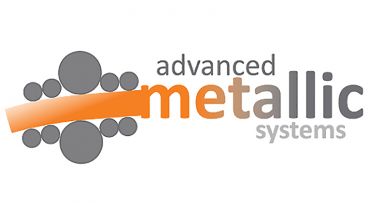
Study with us
Study for a fully-funded PhD or EngD in Advanced Metallic Systems to explore innovative materials and manufacturing routes to increase sustainability and performance.

